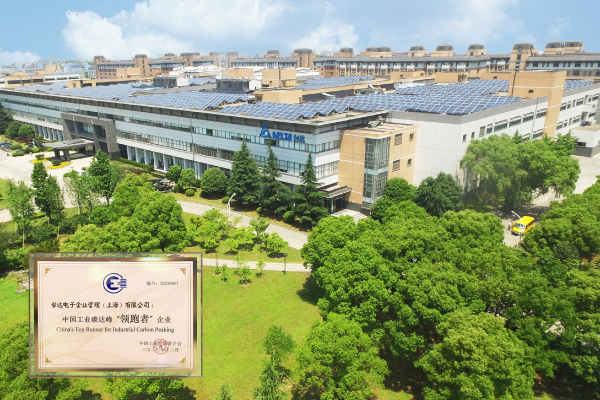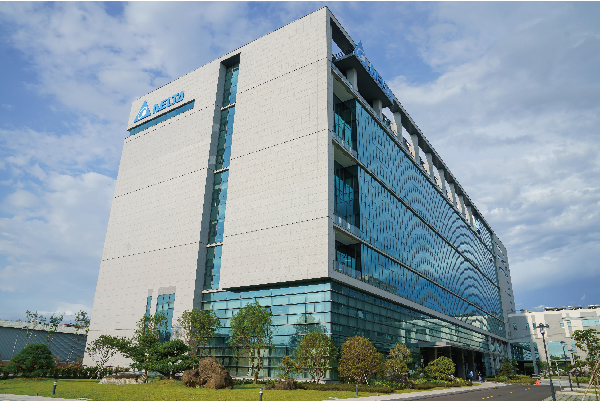To move toward net-zero emissions is also an opportunity for the technology industry to invest in the future. The Sixth Assessment Report (AR6) of the United Nations Intergovernmental Panel on Climate Change (IPCC) has examined the existing technologies that can help mitigate climate change, including new energy, high-performance buildings, low-carbon vehicles, and carbon-negative technologies (Note 2), to strive toward a goal of not exceeding 1.5°C by means of innovative technologies in different fields. These key energy-efficient and carbon reduction technologies and applications are the core of Delta's long-term commitment to sustainable development.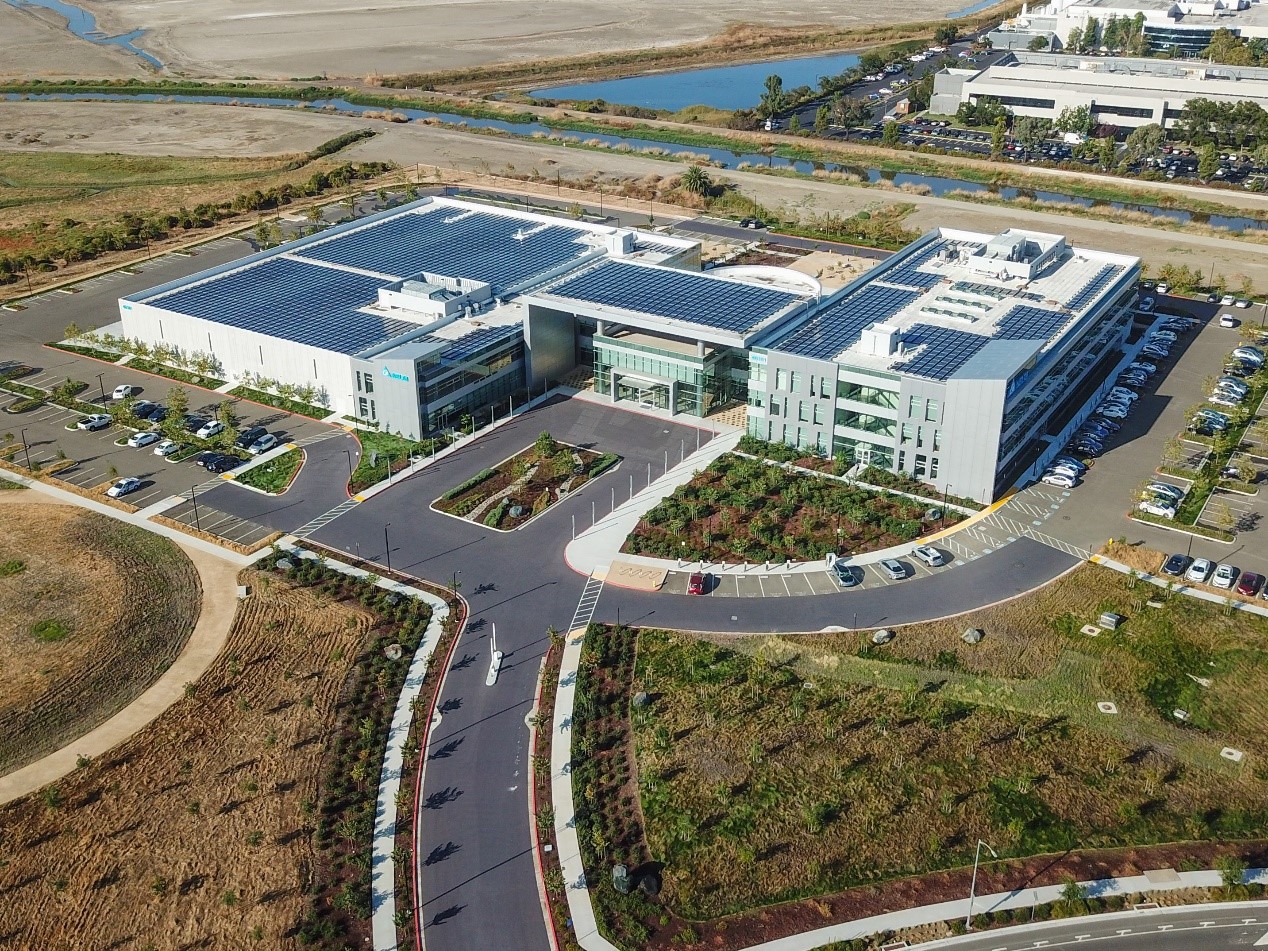
The solar power generation system at the headquarters building in Fremont, California, fulfills Delta's commitment to environmental protection and energy conservation, thereby achieving the goal of net-zero energy consumption.
Development of innovative technologies with energy conservation as the core to achieve energy efficiency With "To provide innovative, clean and energy-efficient solutions for a better tomorrow" as Delta’s business mission, the Company has paid close attention to climate change and global warming issues for a long time, linked business strategies with sustainable development goals, and adopted innovative technologies to mitigate and adapt to climate change. Since Delta was founded more than 50 years ago, the Company, building on its core technology of high-efficiency power electronics and perseverance, has been actively dedicated to the research and development of innovative and forward-looking applications, to not only conserve energy and reduce carbon emissions for the Company itself but realize energy efficiency and create more future business opportunities with sustainable values for the fields of microgrid, renewable energy, low-carbon transportation, automation, and information and communications infrastructure by implementing solutions on the ground.
To make renewable power applications more efficient and stable, Delta has assisted power companies and major commercial and industrial power users in building stable and reliable energy storage systems in recent years. For such systems, Delta combines its core energy control technology and various energy storage batteries and equipment to seek the best arrangement, to respond to grid demand and meet the real-time needs for backup power, thereby improving grid resilience.
For example, Delta's energy storage system is adopted in the power grid in Kinmen for the island mode operation. With the advantage of automatic frequency regulation within 0.2 seconds, it has assisted the power grid in surviving more than 60 power outages with instantaneous voltage rises or drops in a year, ensuring stable power supply. Based on this experience, Delta also built an energy storage system for Lanyu in June 2022 and officially put it into operation to enhance the stability of the power system on the outlying island. Moreover, the energy storage system built by Delta at the Pingzhen Plant was included in Taipower's power trading platform at the end of 2021 to join the field of ancillary service in power market to achieve dynamic frequency regulation and provide backup power, if necessary, around the clock to stabilize the power grid and achieve the energy transition goal.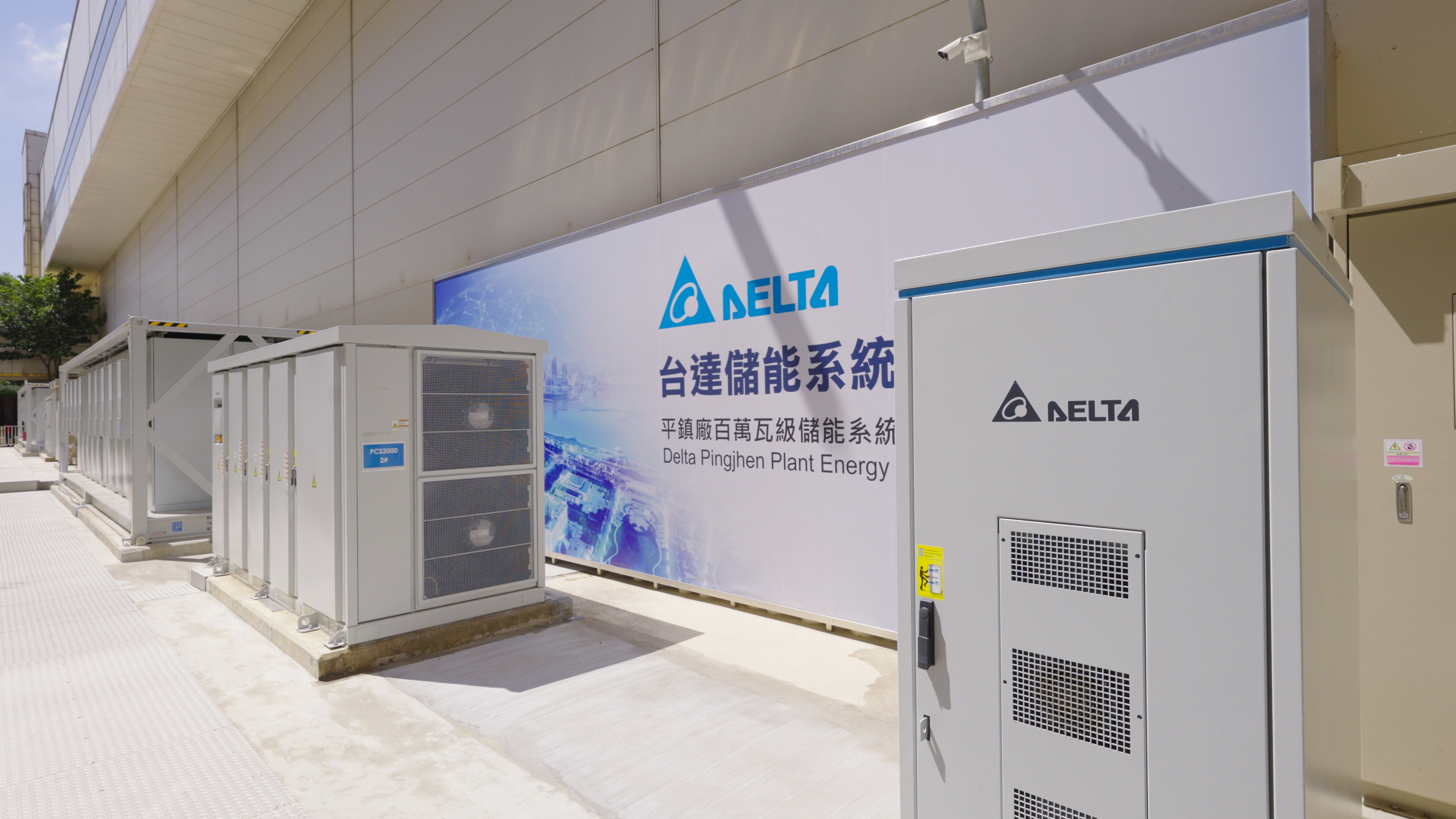
The energy storage system at Delta's Pingzhen Plant has been included in the the field of ancillary service in power market to help stabilize the power grid and achieve the energy transition goal.
Building of green buildings and green data centers worldwide to help enterprises to facilitate carbon reduction In respect of energy-consuming buildings and data centers, Delta has built 30 green buildings and two certified green data centers around the world to enhance the energy efficiency effect through actions, while actively developing building automation solutions to conserve energy and improve energy management efficiency for buildings.
Delta adopted energy-efficient solutions, including building automation, renewable electricity, and a geothermal heating, ventilation and air conditioning (HVAC) system for the green building of its U.S. headquarters in Fremont, California, to achieve the net zero energy consumption goal. Meanwhile, Delta renovated the green building of its headquarters in Taipei, Ruiguang Building, with various smart energy-efficient solutions, and nearly 1.2 million kWh of electricity consumption can be reduced in a year; thus, Delta will break even for the renovation cost in about three years. The Delta Energy Online energy management system adopted by these green buildings can conduct real-time monitoring, measurement, and verification of energy consumption by enterprises and help judge and analyze energy consumption as an important management tool for enterprises to achieve the energy efficiency and carbon reduction goals.
Delta's leading data center energy-efficiency technologies and solutions have also been applied to many well-known companies. For example, Delta assisted the Formosa Plastics Group in building a high-performance and energy-efficiency data center with a power usage effectiveness (PUE) value (Note 3) below 1.5, which is estimated to reduce up to 30% of power consumption each year. Furthermore, Delta provided an immersion liquid cooling solution to satisfy a leading semiconductor company's need for high-performance computing (HPC) to help its data center achieve a PUE value below 1.08 with Delta’s innovative technology and mechanical design.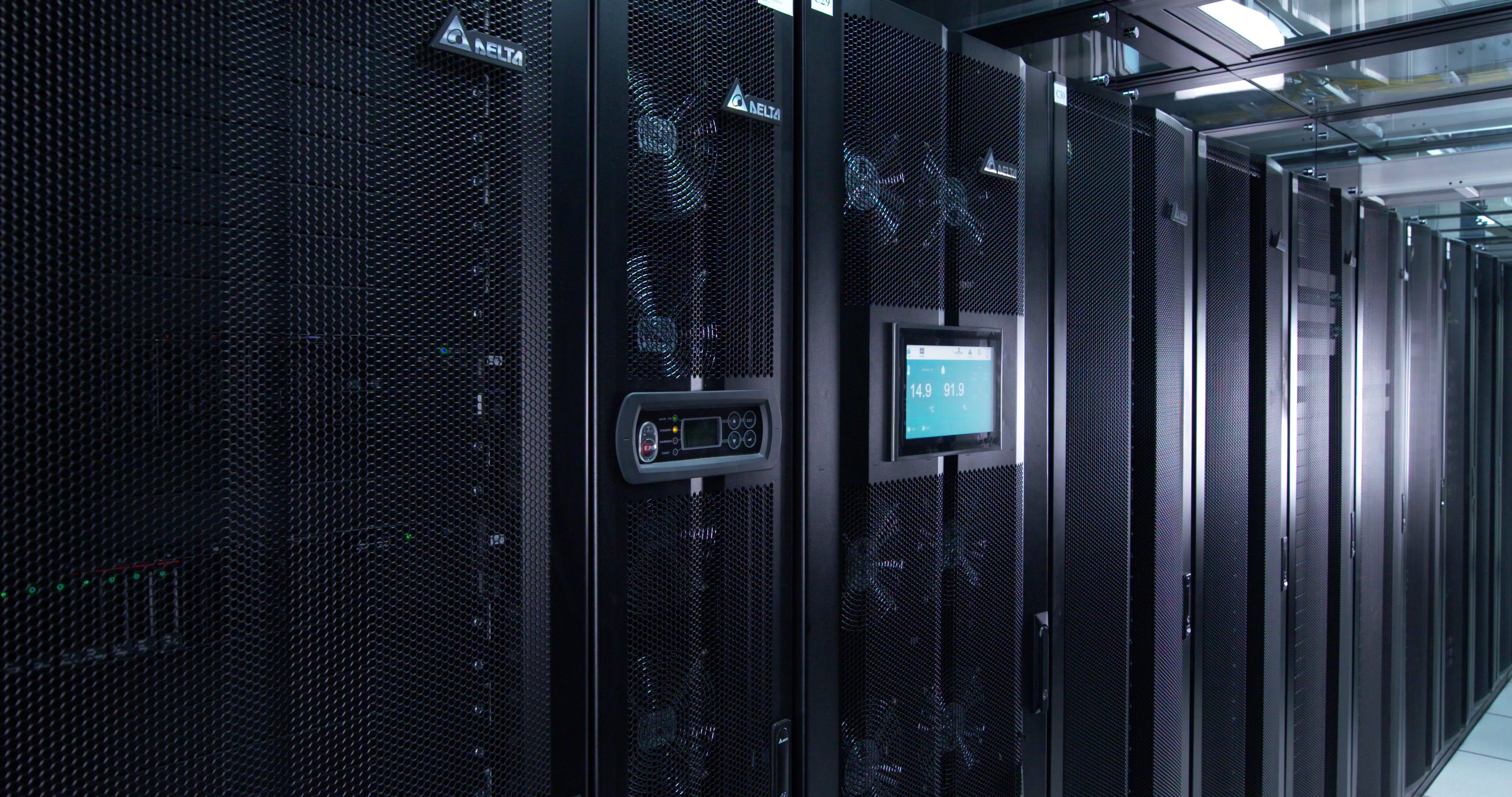
Delta assisted the Formosa Plastics Group in building a data center with a PUE value below 1.5, which is estimated to reduce up to 30% of power consumption each year.
Low-carbon transportation integrated into energy infrastructure to respond to climate disaster emergency In the field of low-carbon transportation, Delta has been investing in the development of electric vehicle power conversion and power systems since 2008 and has now become a top supplier to major global automakers. Its high-efficiency charging solutions to electric vehicles provide reliable charging services in various places, while the charging management system developed by itself can integrate energy storage and renewable power systems to create community microgrids, thereby optimizing energy efficiency.
Delta recently worked with North-star International Co., Ltd. to build the first freeway electric vehicle fast charging station in Taiwan. Delta's latest 200kW fast charging technology was adopted to enable a vehicle to travel 200 kilometers after being charged for 10 minutes. The Company also built Delta's electric vehicle charging station in Yokohama with Idemitsu Kosan Co.,Ltd. by integrating technologies, including a microgrid and smart energy management technology. The station has been selected by the Yokohama City Council's Climate Change Countermeasures Headquarters as a disaster emergency response site to get prepared for any possible climate disasters in advance.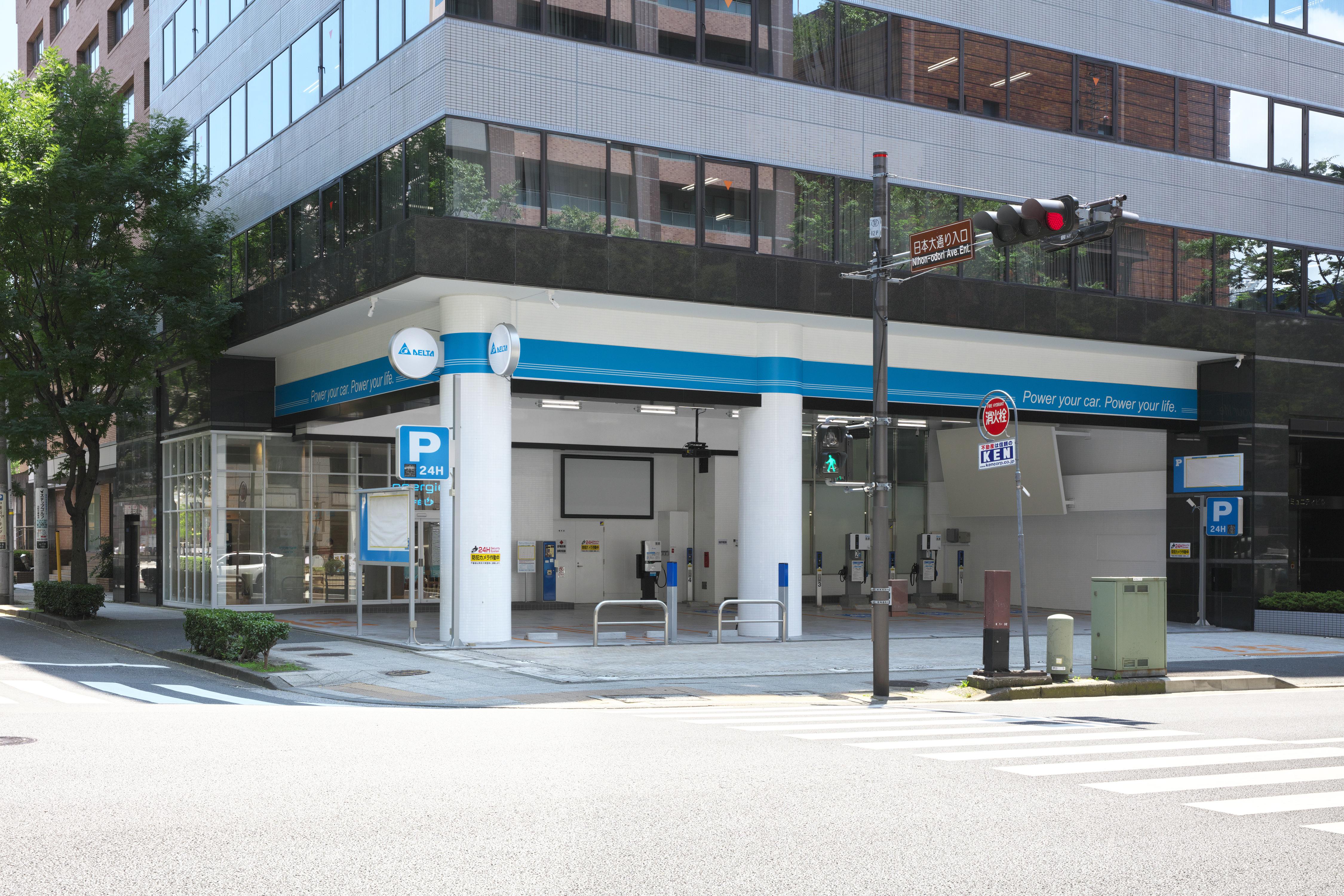
Delta's EV charging station in Yokohama has been selected by the Yokohama City Council's Climate Change Countermeasures Headquarters as a disaster emergency response site.
As of the end of 2021, Delta has completed nearly 1,300 successful cases (Note 4) around the world, helping clients reduce operating costs and enhancing their competitiveness in different application fields, while creating a variety of business opportunities and helping alleviate global warming. Just as Mr. Bruce Cheng, the founder of Delta, has always believed, in addition to pursuing growth and profits, enterprises should concentrate their resources on developing products that contribute to human life and society. Delta will continue to focus on energy conservation and work with partners in various sectors to develop solutions to climate change and create a sustainable future for Earth.
Note 1: The European Parliament passed the CBAM on June 22, 2022 to levy carbon tariffs on carbon emissions of goods, including cement, steel, aluminum, fertilizers, electricity, organic chemicals, plastics, hydrogen and ammonia products, imported into EU countries during the process of production, manufacturing, and transportation. The transition period will begin from January 1, 2023, and the tariff will be officially levied in 2027. Source: CBAM: Parliament pushes for higher ambition in new carbon leakage instrument
Note 2: Source: The IPCC Sixh Assessment Report (AR6) (page 51)
Note 3: Data center power usage effectiveness (PUE) = total power consumption of a data center (power consumption of IT equipment + power consumption of non-IT equipment) / power consumption of IT equipment. The closer the PUE value is to 1, the better the power usage efficiency.
Note 4: Between 2012 and 2021, Delta has completed 1,284 successful cases around the world, including industrial automation products and control systems, building automation, data center infrastructure, communication power supplies, smart monitoring and management systems, electric vehicle charging systems, and renewable energy solutions. Please refer to the 2021 Delta Electronics ESG Report for details.
















